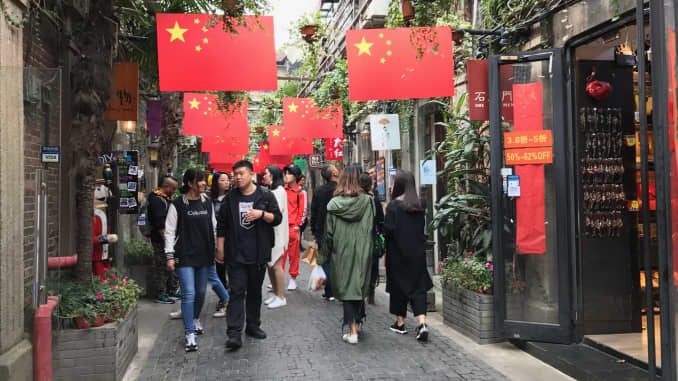จีนมีแนวโน้มที่จะรอสงครามการค้าเนื่องจากเศรษฐกิจของจีน :
เผยแพร่เมื่อ 4 ชั่วโมงที่แล้ว
Weizhen Tan @ WEIZENT
จุดสำคัญ
1) เมื่อความตึงเครียดทางการค้ากับสหรัฐฯเป็นไปได้เศรษฐกิจที่ใหญ่เป็นอันดับสองของโลกน่าจะพยายามทำให้เศรษฐกิจภายในประเทศดีขึ้นซึ่งส่งผลต่อการเติบโตมากกว่าการส่งออก
2)“ เราอธิบายกลยุทธ์ปัจจุบันของจีนว่าเป็น“ ความอดทน”: เป้าหมายหลักคือเพื่อรักษาความยืดหยุ่นทางเศรษฐกิจของจีนในขณะเดียวกันก็เก็บภาษีศุลกากรสหรัฐที่สูงขึ้นตามความเป็นจริง
3) ในขณะเดียวกันจีนจะพยายามกระจายความหลากหลายของห่วงโซ่อุปทานและเร่งการเปิดสู่ประเทศอื่น ๆ - ลดการพึ่งพาสหรัฐในระยะยาว
ตัวเลือกที่ดีที่สุดของจีนในสงครามการค้าคือรอผู้เชี่ยวชาญกล่าวว่าเนื่องจากเศรษฐกิจภายในประเทศขนาดใหญ่กำลังได้รับแรงผลักดันจากพลังของผู้บริโภคไม่ใช่การค้าขาย
การเล่นเกมยาวเป็น“ ตัวเลือกที่ดีที่สุดและดีที่สุดเท่านั้น” ที่ประเทศจีนมี Chung Man Wing ผู้อำนวยการฝ่ายการลงทุนของ Value Partners กล่าว
นักวิเคราะห์ระบุว่าเมื่อความตึงเครียดทางการค้ากับสหรัฐฯเป็นไปได้เศรษฐกิจที่ใหญ่เป็นอันดับสองของโลกน่าจะพยายามทำให้เศรษฐกิจภายในประเทศแข็งแกร่งขึ้นซึ่งส่งผลต่อการเติบโตมากกว่าการส่งออก
“ รัฐบาล (จีน) กำลังพยายามซื้อเวลาด้วยการใช้หน้าต่างเพื่อปรับโครงสร้างเศรษฐกิจภายในประเทศ…ภาคธุรกิจในประเทศ” ชุงกล่าวกับซีเอ็นบีซีในวันพฤหัสบดี
การค้าระหว่างประเทศเป็นเพียงส่วนเล็ก ๆ ของเศรษฐกิจจีนและมีสัดส่วนเพียง 20% ของผลิตภัณฑ์มวลรวมภายในประเทศเขากล่าว “ และส่วนใหญ่นั้นไม่ได้อยู่ที่สหรัฐอเมริกาดังนั้นจีนจึงสามารถเล่นเกมยาวและเล่นได้ดี”
การเติบโตของประเทศจีนเป็นแรงผลักดันภายในประเทศ การบริโภคและการลงทุนโครงสร้างพื้นฐานควรได้รับความสนใจมากกว่าการส่งออก
ANZ
ในความเป็นจริงธนาคารดอยซ์แบงก์กล่าวในรายงานวันพุธว่ามากถึง 80% ของการส่งออกของจีนไปยังประเทศอื่นนอกเหนือจากสหรัฐอเมริกา
“ เราอธิบายกลยุทธ์ปัจจุบันของจีนว่าเป็น“ ความอดทน”: เป้าหมายหลักคือเพื่อรักษาความยืดหยุ่นทางเศรษฐกิจของจีนในขณะเดียวกันก็เก็บภาษีศุลกากรสหรัฐที่สูงขึ้นตามความเป็นจริง
สงครามการค้ายืดเยื้อกับสหรัฐอเมริกาได้ดำเนินต่อไปนานกว่าหนึ่งปีและไม่แสดงสัญญาณของการลดน้อยลง จีนกล่าวเมื่อวันศุกร์ที่ผ่านมาว่าจะกำหนดอัตราภาษีศุลกากรใหม่สำหรับมูลค่าสินค้า 75 พันล้านดอลลาร์สหรัฐ ในการตอบโต้ประธานาธิบดีสหรัฐฯโดนัลด์ทรัมป์กล่าวว่าเขาจะขึ้นอัตราภาษีศุลกากรสำหรับการนำเข้าสินค้ามูลค่า 550 พันล้านดอลลาร์จากจีน
เศรษฐกิจจีน 'ขับเคลื่อนภายในประเทศ'
แต่นักเศรษฐศาสตร์ของ ANZ ชี้ให้เห็นว่าจำนวนผลิตภัณฑ์มวลรวมภายในประเทศของพาดหัวของจีนนั้น“ ได้รับผลกระทบน้อยมาก” แม้หลังจากที่การส่งออกเริ่มลดลงในปี 2018 - เมื่อสงครามการค้าเริ่มต้นขึ้น
“ ผลกระทบ (การค้า) ต่อการเติบโตจัดอยู่ในระดับสูง” ANZ กล่าวในรายงานพุธชี้ให้เห็นว่าการเติบโตของจีดีพีครึ่งปีแรกของจีนในปีนี้ยังคงอยู่ที่ 6.3% แม้ว่าจะมีอัตราภาษีที่ส่งผลกระทบต่อการส่งออกแล้วก็ตาม
ความไม่แน่นอนของสงครามการค้าทำให้รัฐบาลจีนลดเป้าหมายการเติบโตระหว่าง 6% ถึง 6.5% สำหรับปี 2562 - เมื่อเทียบกับปีที่แล้วประมาณ 6.5%
แต่“ การเติบโตของประเทศจีนเป็นแรงผลักดันภายในประเทศ การบริโภคและการลงทุนโครงสร้างพื้นฐานควรได้รับความสนใจมากกว่าการส่งออก” นักเศรษฐศาสตร์ของ ANZ กล่าว
ในขณะที่เศรษฐกิจของจีนชะลอตัวลงการสนับสนุนโดยตรงของสงครามการค้า“ ดูเหมือนจะไม่ใหญ่มาก” Xiong ของ Deutsche Bank กล่าว เขากล่าวว่าการเติบโตที่ชะลอตัวอาจเป็นผลมาจากการลงทุนภาครัฐที่ลดลงหนี้ภาคครัวเรือนที่เพิ่มขึ้นและความพยายามในการลดหนี้ - กระบวนการลดหนี้
เดิมพันกับการบริโภค
ในขณะเดียวกันปักกิ่งก็ดูเหมือนจะพนันเศรษฐกิจของตัวเองเช่นกัน
เมื่อวันอังคารที่ผ่านมาได้มีการเปิดเผยมาตรการเพื่อกระตุ้นการบริโภครวมถึงการยกเลิกข้อ จำกัด ในการซื้อรถยนต์
สภาแห่งรัฐของจีนกล่าวเพิ่มเติมว่าจะส่งเสริมศูนย์การค้าที่ดิ้นรนเชิงพาณิชย์สนามกีฬาและเขตโรงงานเก่าให้เปลี่ยนเป็นศูนย์การค้าเชิงพาณิชย์ยิมและศูนย์รวมความบันเทิง
มันกล่าวว่าปักกิ่งจะขยายเวลาการค้าปลีกเพื่อส่งเสริม“ เศรษฐกิจกลางคืน” ด้วยร้านค้าสะดวกซื้อและร้านอาหารที่เปิดทำการนานกว่า
ในขณะเดียวกันจีนจะพยายามกระจายความหลากหลายของห่วงโซ่อุปทานและเร่งการเปิดสู่ประเทศอื่น - ลดการพึ่งพาสหรัฐในระยะยาว "รายงานของธนาคารดอยซ์แบงก์กล่าว
“ สิ่งนี้จะช่วยเศรษฐกิจจีนและเพิ่มต้นทุนให้สหรัฐในสงครามการค้า” Xiong เขียน
หมายเหตุ : 1) โปรดติดตามการ Long และ Short Set 50 Derivatives ในระยะยาวได้ใน longtunbysak.blogspot.com และ Group Facebook
ที่ https://www.facebook.com/groups/2088093934817836/
2) ที่มาจาก ( www.cnbc.com ) ตามรายละเอียดเนื้อข่าวจากต้นฉบับภาษาอังกฤษ ดังนี้ คือ :
China will likely wait out the trade war as it bets on its own economy :
China’s best option in the trade war is to wait it out, experts say, as it’s huge domestic economy is increasingly being driven by the power of its consumers — not trade.
Playing the long game is “probably the best and only option” that China has, said Chung Man Wing, investment director at Value Partners.
“The (Chinese) government is trying to buy time in terms of using the window to restructure the domestic economy ... the domestic corporate sector,” Chung told CNBC on Thursday.
External trade make up only a “very small portion” of China’s economy — and form only about 20% of its gross domestic product, he said. “And majority of that is actually not to the U.S., so China can afford to play the long game, and play it well.”
In fact, Deutsche Bank said in a Wednesday report that as much as 80% of China’s exports went to countries other than the U.S.
“We describe China’s current strategy as ‘endurance’: the main goal is to preserve China’s economic resilience, while taking the higher US tariffs as a given fact,” Deutsche economist Yi Xiong wrote in the report.

The protracted trade war with the U.S. has gone on for more than a year, and shows no signs of abating. China said last Friday it would impose new tariffs on $75 billion worth of American goods. In retaliation, U.S. President Donald Trump said he would hike tariff rates on $550 billion of imports from China.
China economy ‘domestically driven’
But ANZ economists pointed to how China’s headline gross domestic product number was “barely affected” even after its exports started to drop in 2018 — when the trade war began.
“The (trade) impact on growth was over-rated,” ANZ said in a Wednesday report, pointing out that China’s first-half GDP growth this year was still 6.3% — even with tariffs already affecting its exports.
The trade war uncertainty led the Chinese government to lower its growth target of between 6% and 6.5% for 2019 — compared to last year’s roughly 6.5%.
But, “China’s growth is domestically driven; consumption and infrastructure investment deserve more attention than exports,” the ANZ economists wrote.
While China’s economy has slowed, the direct contribution of the trade war “does not seem to be very large,” Deutsche Bank’s Xiong wrote. Instead, he said the slowing growth could largely be attributed to a decline in government investment, higher household debt, and deleveraging efforts — the process of reducing debt.
Betting on consumption
Meanwhile, Beijing appears to be also betting on its own economy.
On Tuesday, it unveiled measures to boost consumption, including the possible removal of restrictions on auto purchases.
China’s State Council added it would encourage commercially struggling malls, stadiums and old factory zones to be transformed into commercial complexes, gym and entertainment centers.
It said Beijing will be extending retail hours to promote “the night economy,” with convenience stores and restaurants staying open longer.
Meanwhile, China will also try to diversify its supply chains and accelerate its opening up to other countries – reducing its reliance on the U.S. in the longer term, said the Deutsche Bank report.
“This will both help the Chinese economy and increase the cost for the US in a trade war,” Xiong wrote.
